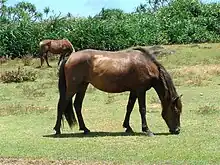hepoin
Ingrian

Kaks hepoista.
Alternative forms
- heppoin (dialectal)
Pronunciation
- (Ala-Laukaa) IPA(key): /ˈhepoi̯ne/, [ˈhe̞po̞i̯n]
- (Soikkola) IPA(key): /ˈhepoi̯n/, [ˈhe̞pˑo̞i̯n]
- Rhymes: -epoi̯n
- Hyphenation: he‧poin
Noun
hepoin
- horse
- 1936, N. A. Iljin and V. I. Junus, Bukvari iƶoroin șkouluja vart, Leningrad: Riikin Ucebno-pedagogiceskoi Izdateljstva, page 55:
- Kaks koivuist hepoist lunta mööt livvuttaat.
- They slide two birchen horses along the snow.
- 1936, V. I. Junus, Iƶoran Keelen Grammatikka, Leningrad: Riikin Ucebno-pedagogiceskoi Izdateljstva, page 73:
- Poika noisi hepoisen selkää.
- The boy got up the horse's back.
- 1936, D. I. Efimov, Lukukirja: Inkeroisia alkușkouluja vart (ensimäine osa), Leningrad: Riikin Ucebno-pedagogiceskoi Izdateljstva, page 52:
- Leƶƶii pellool hepoisen pää.
- A horse's head laid on the field.
Declension
| Declension of hepoin (type 1/kärpäin, no gradation) | ||
|---|---|---|
| singular | plural | |
| nominative | hepoin | hepoiset |
| genitive | hepoisen | hepoisiin |
| partitive | hepoista, hepoist | hepoisia |
| illative | hepoisee | hepoisii |
| inessive | hepoisees | hepoisiis |
| elative | hepoisest | hepoisist |
| allative | hepoiselle | hepoisille |
| adessive | hepoiseel | hepoisiil |
| ablative | hepoiselt | hepoisilt |
| translative | hepoiseks | hepoisiks |
| essive | hepoisenna, hepoiseen | hepoisinna, hepoisiin |
| exessive1) | hepoisent | hepoisint |
| 1) obsolete *) the accusative corresponds with either the genitive (sg) or nominative (pl) **) the comitative is formed by adding the suffix -ka? or -kä? to the genitive. | ||
Derived terms
This article is issued from Wiktionary. The text is licensed under Creative Commons - Attribution - Sharealike. Additional terms may apply for the media files.